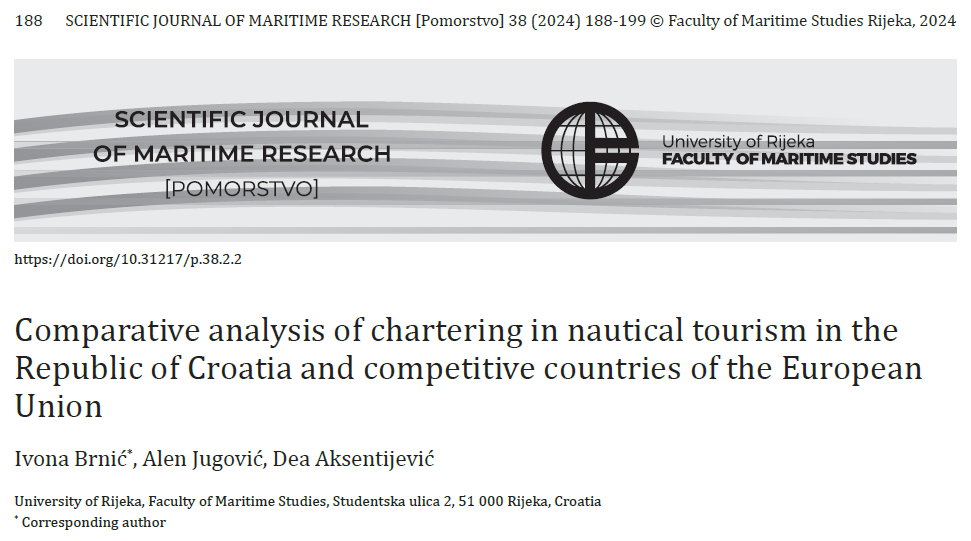Comparative analysis of chartering in nautical tourism in the Republic of Croatia and competitive countries of the European Union
Keywords:
nautical tourism, nautical charter, Croatian coastline, European UnionAbstract
Nautical tourism is an economic phenomenon that has played an increasingly important role in the economic growth of the coastal states of the European Union in recent decades. Strictly speaking, nautical tourism is a part of tourism that, according to data from 2021, accounts for as much as 15.9% of the total GDP of the Republic of Croatia. Despite these high numbers, Croatia lags behind European countries such as France, Spain and Italy due to its relatively weak nautical tourism offer. Considering the climatic and spatial conditions and the long coastline rich in relief, Croatia still has a lot of unused potential for the development of nautical tourism. Nautical charter is one of the most underdeveloped activities of nautical tourism, especially in the area of luxury charter, which refers to the rental of luxury yachts. Daily and multi-day charters are more common in Croatia, but the lack of differentiation of the fleet and inadequately trained personnel make it impossible for the services offered to meet the demand. This is particularly evident in the period following the Covid 19 pandemic, which has greatly changed the economic and social point of view of boat users.
The aim of this scientific article is to compare the nautical tourism of the Republic of Croatia and selected countries of the European Union, with special attention to the nautical charter, in order to gain insight into the current state of the market and identify advantages and disadvantages. of charter tourism to enable the further development of the Republic of Croatia in the above-mentioned field. Through the collected statistical data the prices and quality of the nautical charter service in Croatia and competing countries of the European Union, the results were compared and analyzed. Considering the affordability of renting motor and sailing yachts, the competitiveness of the Republic of Croatia on the European market is undeniable. However, this work also examines whether the existing infrastructure and superstructure can support the potential development of nautical charter in the Republic of Croatia.

Downloads
Published
Issue
Section
License
Copyright (c) 2024 Ivona Brnić

This work is licensed under a Creative Commons Attribution-NonCommercial-NoDerivatives 4.0 International License.
Scientific Journal of Maritime Research understands the need for authors to disseminate and maximize the impact of their research. When submitting an article for publishing in Scientific Journal of Maritime Research, it implies that the Corresponding Author transfers, with the consent of all Coauthors, the copyright ownership in the referenced submission, including all versions in any format now known or hereafter developed, to the Scientific Journal of Maritime Research.
Copyright protects your original work and research material and prevents others from using it without your permission. Others will be required to credit you and your work properly, thus increasing its impact. Should your submission be rejected or withdrawn prior to acceptance for publication by Scientific Journal of Maritime Research, this transfer will be null and void.
Authors, users or readers of an article need clear instructions on how they can use the article. Scientific Journal of Maritime Research uses the Creative Commons Attribution-NonCommercial-NoDerivatives (CC-BY-NC-ND) 4.0 International License, which governs the use, publishing and distribution of articles by authors, publishers and the wider general public.
The authors are allowed to post a digital file of the published article, or the link to the published article (Scientific Journal of Maritime Research web page) may be made publicly available on websites or repositories, such as the Author’s personal website, preprint servers, university networks or primary employer’s institutional websites, third party institutional or subject-based repositories, and conference websites that feature presentations by the Author(s) based on the published article, under the condition that the article is posted in its unaltered Scientific Journal of Maritime Research form, exclusively for non-commercial purposes.




